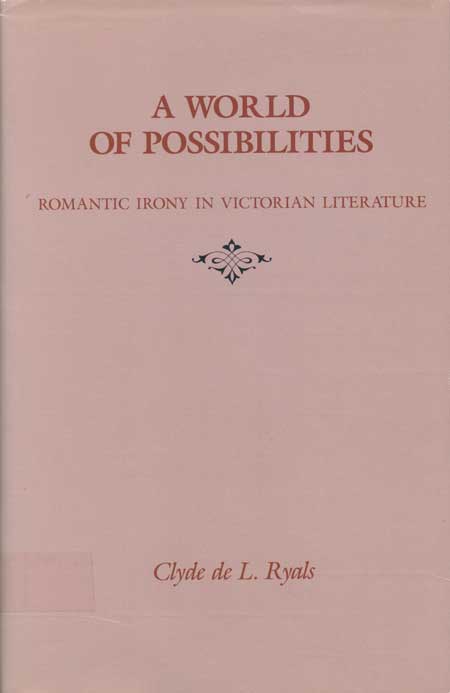| click here to read the full text of this book | leave / read comments and critiques of the book |

A World of Possibilities
Romantic Irony in Victorian Literature
Clyde de L. Ryals
Romantic irony has been associated with certain English literary works of both the Romantic period and the twentieth century, but in A World of Possibilities, Clyde de L. Ryals demonstrates that it also informs the literature of the Victorian period. Ryals’s ground-breaking study shows how romantic irony characterizes works, in various genres, by Carlyle, Thackeray, Browning, Arnold, Dickens, Tennyson, and Pater.
Taking as its point of departure Friedrich Schlegel’s observations on romantic irony as “an image of the age,” A World of Possibilities explores how the Victorians’ irony is not an eighteenth-century irony of negative absurdity: it is not subsumed by either the normative irony or the epistemological irony espoused by the two chief contemporary theorists of literary irony. Ryals claims that while Wayne C. Booth reconstructs and Paul de Man deconstructs, Victorian romantic irony does both. Where deconstructionists insist on the death of meaning and reconstructionists maintain that meaning is fixed and final, Victorian romantic ironists are less concerned with meaning than with the possibility of meaning.
Although it may ultimately elude definition, Victorian romantic irony nevertheless has certain defining characteristics. Ryals examines how it is formally a mixture of styles, modes, and genres; how it avoids closure and determinate meaning as it deconstructs the invented world that it pretends to offer, reflexively mirroring its author and itself; how it displays the oppressiveness of materiality as it presents characters conceiving of themselves as dramatis personae; how it is distrustful of its own linguistic medium and invites the constructive participation of the reader; and how it is permeated by a sense of play, as it permits the creative self to hover above its image and glory in its own self-activity.
Finally, Ryals argues for a new way of reading Victorian literature. Where other have noted the spiritual doubts, anguish, and dividedness and, as a result, have too often regarded it as essentially melancholy, or even tragic, Ryals suggests that the writings of the great Victorians should be viewed with acknowledgment and acceptance of contradictions and paradoxes, as an embrace of a fertile world of possibilities.
Clyde de L. Ryals is professor of English at Duke
University. He is the author of Theme and Symbol in Tennyson’s Poetry to 1850, From the Great Deep, Browning’s Later Poetry, and Becoming Browning.
| 1990 163 pp. | This title is no longer available in a traditional print edition. Click here for free access to the book's full text. |
| Studies in Victorian Life and Literature |

